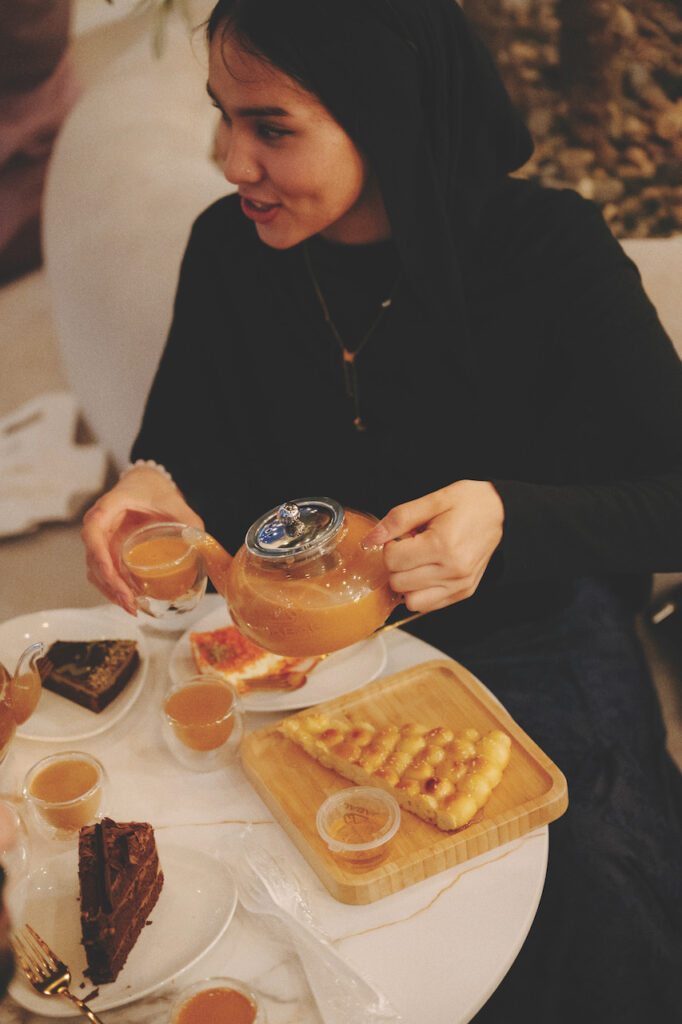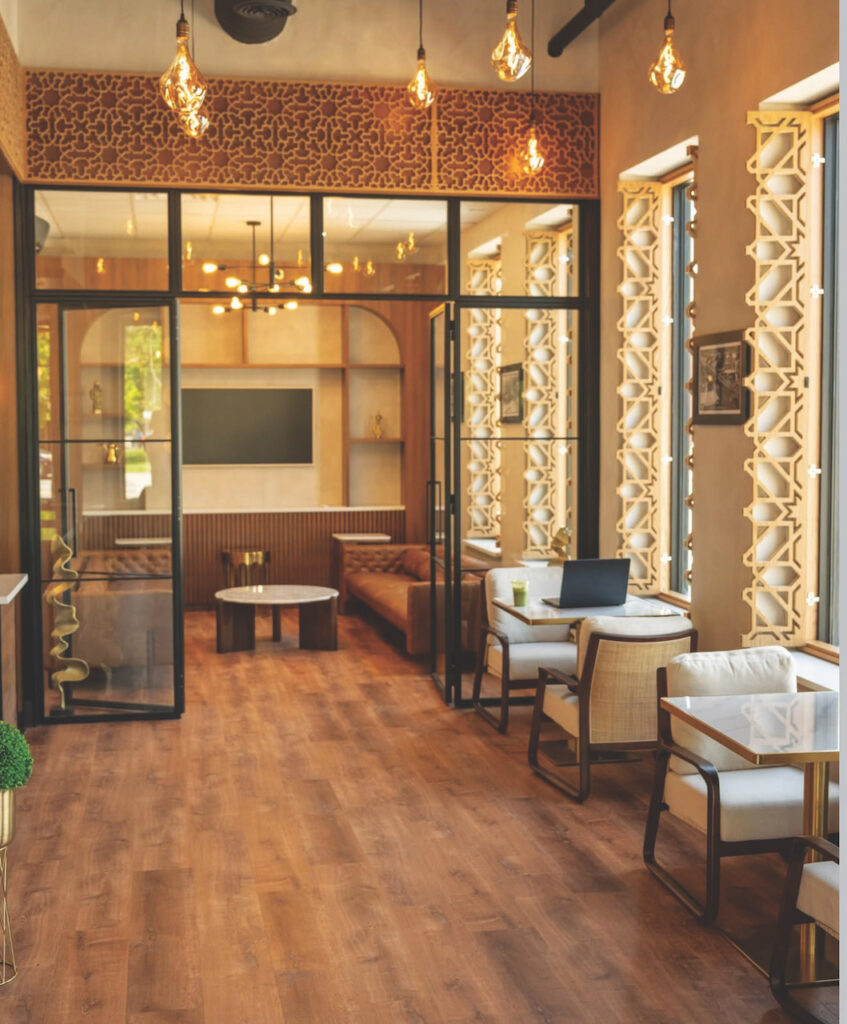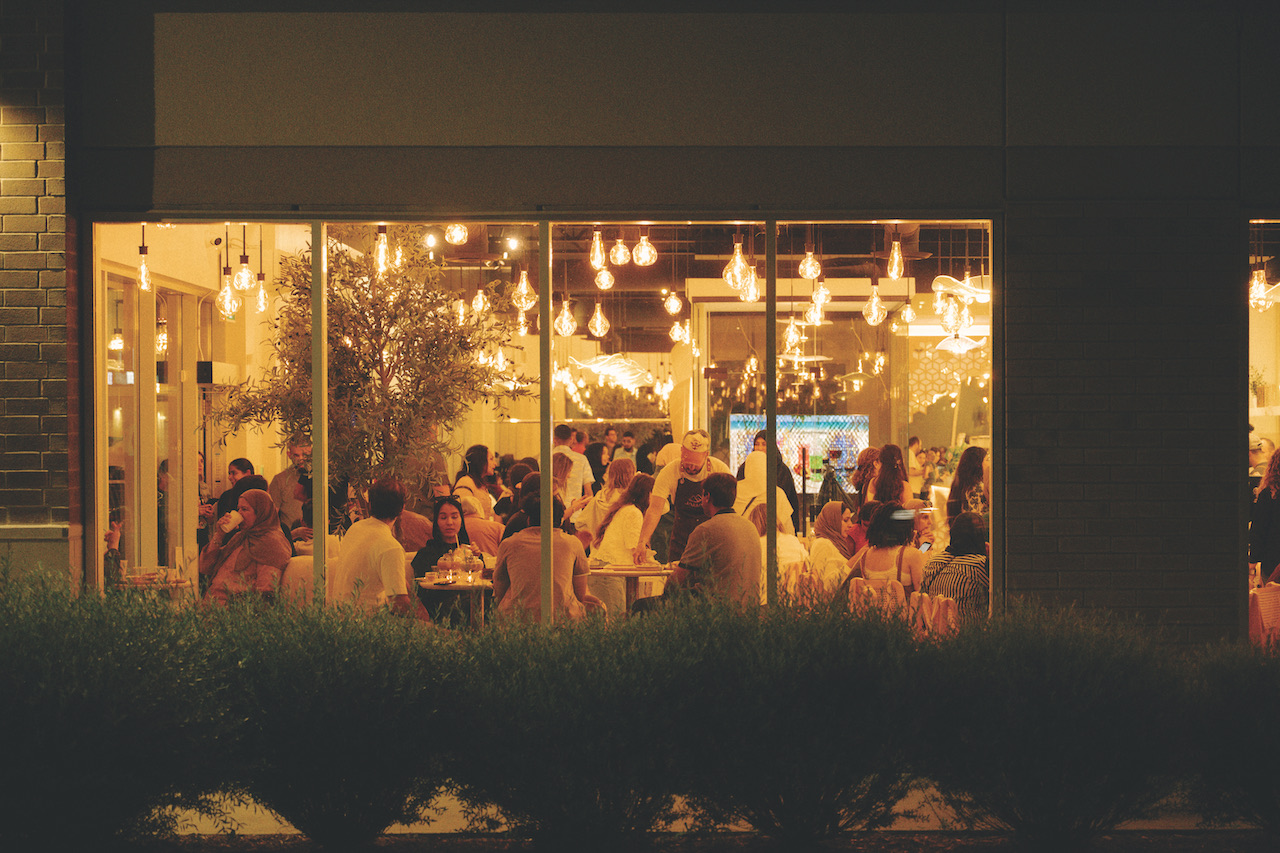It’s midnight at Qamaria Yemeni Coffee Co., just west of Toronto, Ont. The modern Middle Eastern-inspired space—filled with the aroma of fresh roasted coffee and the music of popular Arabic singers like Abu Bakr Salem—is buzzing with groups of young people. They’re chatting, laughing and celebrating over sleek carafes of cardamom-infused Mofawar coffee and Zatar pie.
Located in a sprawling 2,200-square-foot, two-storey red-brick building in Mississauga, Ont.’s historic village of Streetsville, Qamaria opens every day at 8 a.m., but evenings are when the place really comes alive. “On weekdays, until midnight, we’re at 50 to 75 per cent occupancy,” explains Anwar Ahmad, co-owner and operator of Qamaria, who says that Friday and Saturday nights, when Qamaria stays open until 1 a.m., are its peak hours.
Qamaria, which opened in April 2025 with its fluted wood feature walls, velvet seating, columns adorned with phrases in Arabic and Himyaritic (an ancient Yemeni language) and its trademark qamaria (Arabic for “arched stained-glass windows”), is just one of many Yemeni coffee houses popping up in major North American cities, including Dallas, New York and Toronto. “Being Yemenis, we’re always connected to having coffee as part of our culture,” says Ahmad.


Coffee was first cultivated in Yemen in the 15th century. “The name ‘mocha’ is actually a city in Yemen—Al-Makha—where coffee was exported to the world,” Ahmad explains.
Traditionally, it’s less about coffee shops and more about serving coffee in homes. “It’s our way to host people, to gather with people and be kind and generous,” he says.
Ahmad immigrated from Yemen to Canada as a teenager in the early 1990s, and he recalls how his parents would host guests at the family home over coffee. Serving and drinking coffee could help set the scene for exchanging business ideas, for students studying or simply for a social gathering between family and friends.
“Part of the Yemeni culture is to roast the coffee fresh before we brew it,” he adds. “Proper hosting is to let people smell the aroma of coffee.” Then, the coffee is brewed in a traditional vessel called a jebena (made of clay or metal) and poured from a dallah, a decorated coffee pot, to serve each guest.
While at-home roasting may be an appealing option for some, this traditional part of the process is not realistic for most. This has contributed to the wave of Yemeni coffee houses on this side of the Atlantic. Just don’t call it a trend! Yemeni coffee-house culture is filling a real void in the marketplace.
Perhaps the biggest draw, besides the artisanal coffee and pastries, is having a place to socialize in the evenings that isn’t a bar or club. Yemeni coffee houses aren’t typically grab-and-go establishments. Drinks, such as the maleki, with coffee, husks, ginger, cinnamon and light cream, are meant to be savoured while you socialize. (Though patrons can still take their orders to-go.)

Among the first to explode onto the scene was Haraz Coffee House, which opened its doors in Dearborn, Mich., in 2021 and continues to expand. Sam Ali, the company’s marketing manager, says that there are now 31 Haraz locations in the U.S. and 170 in development in North America. Like Qamaria, Haraz locations are open late—some until 1 a.m. on the weekend. “At night, you see big groups of 6 or 8, sometimes 12 or 14, having meet-ups or celebrating birthdays,” Ali explains.
“Islam forbids the consumption of alcohol,” Ali explains. “I could go to a bar and ask for a Sprite. But everyone else is having beer; I don’t feel like I belong there.” Rama Eloulabi is a PhD student in social psychology at Western University who hails from Syria. In 2023, she wrote her master’s thesis on the ethnic identity and intersectionality of young Arabs in Canada. Eloulabi identified a lack of safe and welcoming “third spaces”—spots outside of work or home—where youth can spend time. “There’s a real gap for where young Arab people, particularly Arab students, can hang out, be around each other and meet new people,” she says. “I think these types of coffee houses also create a place for young Arabs to potentially find romantic partners or marriage prospects as well.” In February 2024, an article in The Guardian, written by Ahmed Ali Akbar, detailed how Yemeni coffee houses in Michigan are becoming hot spots for young Muslim people to find love.
It’s our way to host people, to gather with people and be kind and generous
Anwar Ahmad, co-owner and operator of Qamaria
Eloulabi describes the feeling of belonging during a recent trip to a Yemeni coffee house. “I think there’s a sense of safety, perhaps, and familiarity in walking into a place where everyone seems to look like you or like your brother or like your mom,” she explains. “I was very excited to go. Seeing certain items on the menu, I was like, ‘Oh my god, they have karak,’” says Eloulabi, referring to the sweetened black tea flavoured with nutmeg and cardamom, and served with milk, which is known as adeni in Yemen.
Get the
Three from 3
newsletter
Join our global community of sharp, curious thinkers to receive a carefully curated email of the three most important things to read, see and do this week.
Listen and learn.
Tune into Third Culture Leaders, a podcast hosted by our co-founder and publisher, Muraly Srinarayanathas.
Explore how leaders skillfully navigate multiple cultural landscapes, leveraging their diverse backgrounds to drive innovation and change.
Qamaria and Haraz coffee houses are in good company with Yemeni Corner Coffee House, Matari Coffee Co. and Jabal Coffee House, all opening between 2022 and 2025. The bulk of these have franchise headquarters in Michigan, which boasts one of the largest populations of Arab people outside of the Middle East. “The vast majority of that growth is actually in Yemeni-Americans,” explains Ali, whose family is from Yemen. “There are a lot of issues going on in Yemen right now, with the civil war and a famine that forced people to leave the country,” he says.

Since Gen Z is drinking less alcohol, Yemeni coffee houses are also becoming an important third space for people outside of Arab cultures, too. This presents an opportunity to rewrite the narrative generated from news headlines and pop culture. “Unfortunately, there are quite a lot of negative stereotypes when it comes to people from the Middle East,” Eloulabi explains. “A place like a Yemeni coffee shop allows Arabs to feel like they are being generous with you. They are presenting you with their food, their drinks and their music. And they are in control of how you’re perceiving them, as opposed to, perhaps, media or pop culture or other spaces, where they don’t have control over how they’re being perceived. It’s important to feel like you are in control of how people are consuming your culture.”
Ali, too, sees Yemeni coffee houses as a powerful identity-shaping tool. “We know it’s probably going to be a very long while, if ever, that we get to go back to our home country. But what we’re doing is bringing our life and culture here.”
